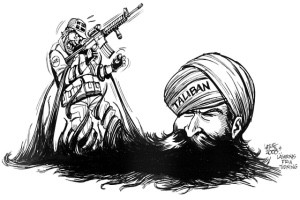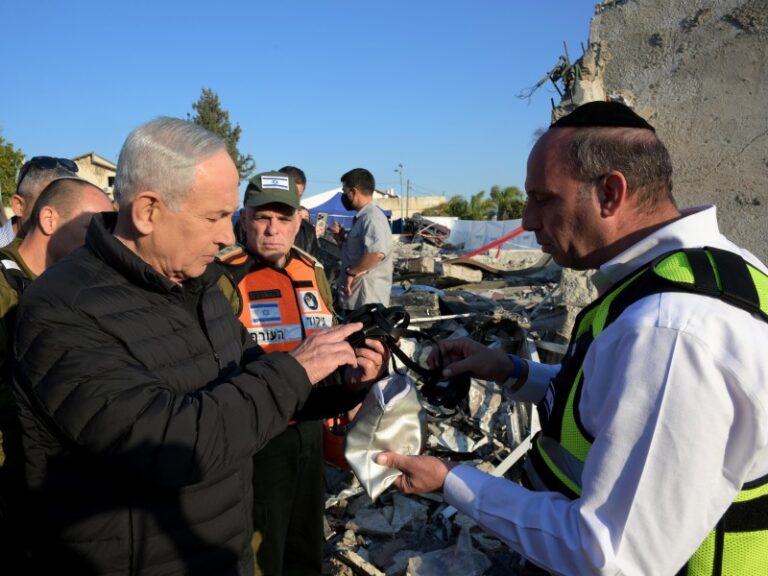
Illustration by Carlos Latuff
India shuts down its Consulate office in Mazar-e-Sharif
Kabul/New York/Washington DC: With rising violence and Taliban fighting a fierce battle with the Government forces to take control of the country, in four Afghan cities alone — Lashkar Gah, Kandahar, Herat and Kunduz — at least 183 civilians have so far been killed and 1,181 injured, and that includes children, since July 9, 2021.
The United Nations High Commissioner for Human Rights, Michelle Bachelet, though noted on August 10 that these were just the civilian casualties they had managed to document, and that the real figures was likely to be much higher.
Besides, there were indications that the Taliban were imposing severe restrictions on human rights in the areas under the Taliban control, particularly targeting women too.
In Washington DC, the department spokesperson at the US Department of State, Ned Price, told reporters the levels of violence in Afghanistan were of grave concern and were “certainly not within the spirit of the U.S – Taliban agreement.”But we know that diplomacy is the only way that we are ever going to achieve a durable solution and, insofar as we are concerned, a just solution,” he said. When probed further on the issue of Taliban’s advancement while just about three weeks remaining for the complete withdrawal of the US troops, Price said the US had “not taken any tool off the table except for this military presence on the ground”. He said the Afghan Government continues to have a capable and highly numerically superior fighting force. “They are imposing costs. They have the potential to impose even greater costs on the Taliban. Of course, there are other tools at our disposal that fall short of reintroducing U.S. forces. We have not ruled any of those out, and so if it’s appropriate for us to use them, we won’t hesitate to do so.”
The USA made it clear that for getting recognition, any future government of Afghanistan must emerge from a political settlement that meets five criteria. First, it must be inclusive; second, it must respect the rights of all Afghans, including women and minorities; third, it allows the Afghan people to have a say in choosing their leaders; fourth, it must prevent Afghan soil from being used to threaten the United States and its allies and partners; and fifth and finally, it must respect its commitments in terms of international law and international humanitarian law.
“We’ve made these criteria very clear to the Taliban,” Price said.
In the meantime, as violence keeps escalating with the Taliban militants advancing on, India yesterday evacuated its diplomats and personnel from its consulate in Mazar-e-Sharif, the largest city of north Afghanistan, and simultaneously, the Indian embassy in Kabul issued its third security advisory in three months, asking Indian expats to leave Afghanista. The Indian Consulate General, Mazar-e-Sharif, also tweeted yesterday: “A special flight is leaving from Mazar-e-Sharif to New Delhi. Any Indian nationals in and around Mazar-e-Sharif are requested to leave for India in the special flight scheduled to depart late today evening.”
The Office of the United Nations High Commissioner for Refugees (UNHCR) said that, amid intensified clashes in Nimruz in the country’s south-west, nearly 200 Afghan refugees were forced to flee into Iran over the weekend. UNHCR warned that many more Afghan civilians might find themselves trapped if they were unable to escape from what it called, the highly volatile situation.
Also read: Tens of thousands of people feared trapped by fighting in south Afghanistan
As an example of the brutal nature and scale of violence in Afghanistan, the UN Children’s Fund (UNICEF) had claimed on August 9 that, in the last 72 hours, 20 children were killed and 130 injured in Kandahar province alone, and had expressed it shock at the rapid escalation of grave violations against children in Afghanistan “The atrocities are growing higher by the day,” it stated.
It is also estimated that since the beginning of the year, nearly 400,000 Afghan men, women and children have been internally displaced within the country — some 244,000 of them since the month of May.
While Bachelet warned that the failure to stem the rising violence and human rights violations was having disastrous consequences for the people of Afghanistan, Stéphane Dujarric, Spokesman for the UN Secretary-General, told reporters in New York last night (IST), “We continue to be in touch with all the parties, whether in Afghanistan or the regional parties, in an effort to find a political solution.”
Authorities concede that the facts on the ground were extremely worrying, with the most vulnerable civilians finding themselves in the crosshairs of fighting especially in urban ares. Afghan Minister of Foreign Affairs Mohammad Haneef Atmar, who yesterday met with Chargé d’Affaires of the US Embassy in Kabul Mr. Ross Wilson, to discuss security developments in the country and the Afghan peace process, asserted “the call of the Afghan people” for an immediate end to the Taliban attacks on cities and the killing of people in different parts of Afghanistan.
It may be mentioned that Afghanistan Government has asked for two special sessions of the UN Security Council and the UN Human Rights Council on Afghanistan, and Atmar called for Washington’s constructive support and cooperation with Kabul in that regard.
During the meeting with Wilson, Atmar stressed the importance of dialogue on the establishment of a ceasefire, the resumption of negotiations, and the restoration of lasting peace and stability in Afghanistan as issues to be discussed at the forthcoming UN Security Council session. He also called on the UN Human Rights Council to send a fact-finding mission to Afghanistan to investigate human rights abuses and war crimes, and to prosecute violators and perpetrators of war crimes.
“All this should be a reminder for the parties to actually focus on a political process,” Dujarric said in New York.
Bachelet stressed that the parties to the conflict must stop fighting to prevent more bloodshed, and that the Taliban must cease their military operations in cities. She also urged all States to use their influence — bilaterally and multilaterally — to bring the hostilities to an end.
The deteriorating situation impact on mobile and displaced populations, including returnees is equally concerning. The head of the International Organization for Migration (IOM), António Vitorino, said that IOM would continue to support the people of Afghanistan, providing emergency shelter, core relief items, emergency health services and protection assistance to displaced persons.
Earlier, the UN Under-Secretary-General for Humanitarian Affairs and Emergency Relief Coordinator, Martin Griffiths, had sought to remind all parties to the conflict of their obligations under international humanitarian and human rights law, including their responsibility to protect civilians and ensure access for humanitarian organizations to reach people in need.
In a statement on August 9, Griffiths underscored that fighting across the country had claimed the lives of more than 40,000 people since 2009 when UN reporting began.
The UN Secretary-General António Guterres and members of the Security Council had strongly condemned attacks against civilians and had called for a ceasefire.
– global bihari bureau





